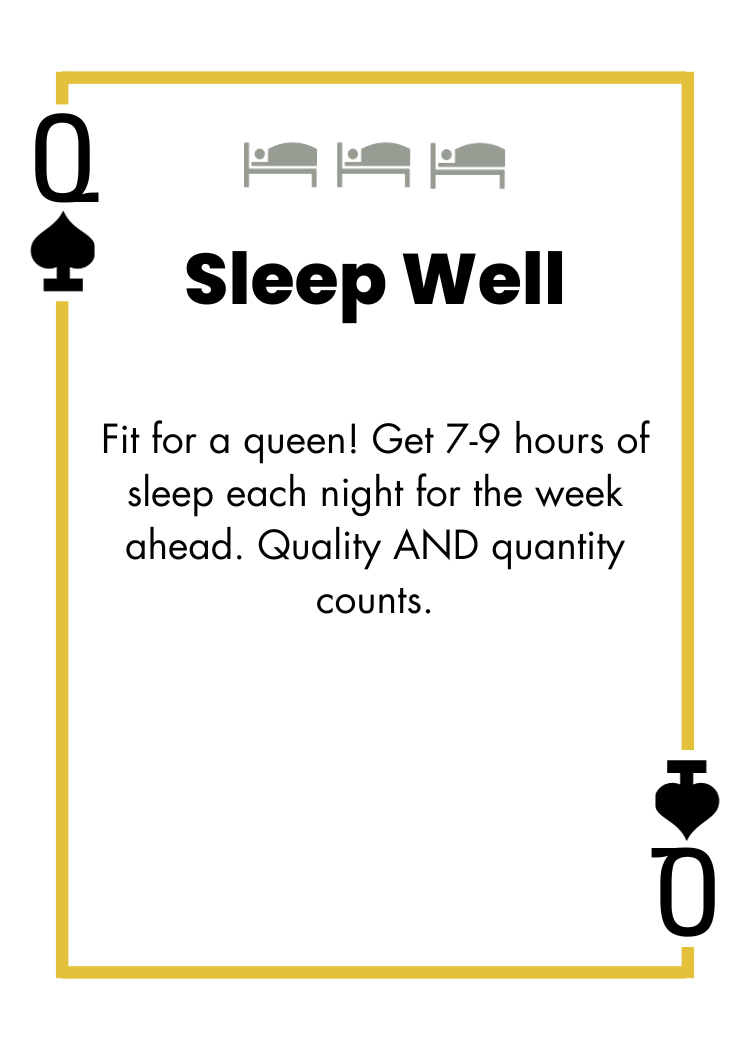Queen of Spades - Enough Sleep

Fit for a queen! Get 7-9 hours of sleep each night for the week ahead. Quality AND quantity counts.

“Good morning! Did you have a good sleep?”
“Yes, I slept very well for three whole hours!”
Get it?
Sleep quality is only one part of the equation. No matter how well you are sleeping, it is crucial to make sure you are getting enough sleep. Extensive research has been done to try to determine the optimal number of hours that a person should sleep for. While the perfect amount of sleep varies between people, 7-9 hours each night is generally a good recommendation (Sleep Health Foundation, 2023).
Sleep requirements can differ based on age. The Ministry of Health NZ recommends the following:
- Newborn (0–3 months): 14 to 17 hours
- Infant (4–11 months): 12 to 15 hours
- Toddler (1–2 years): 11 to 14 hours
- Preschool (3–4 years): 10 to 13 hours
- School-age (5–13 years): 9 to 11 hours
- Teens (14−17 years): 8 to 10 hours
- Adults (18−64 years): 7 to 9 hours
- Older adults (65+ years): 7 to 8 hours
Here are three important points to keep in mind:
- Get enough sleep.
- Don’t get too much sleep.
- Get the right amount of sleep consistently.
Firstly, get enough sleep. Research shows that short sleep increases your risk of obesity, high blood pressure, and diabetes, while getting enough sleep is associated with longevity (Mallinson et al., 2019). You are also less likely to get ill from a virus if you get a sufficient amount of sleep (Bjorvatn et al., 2023).
Curious as to why we are recommending 7-9 hours of sleep and not 7+ hours? You may be surprised to hear that too much sleep is also detrimental to health. That brings us to our second point; don’t get too much sleep.
Research shows that excessive sleepers may be at a greater risk of metabolic, heart, and brain diseases, as well as depression (Rainer, Palmer & Xie, 2022).
Thirdly, get enough sleep consistently. You may have heard of the concept of sleep debt, or at least have been exposed to the idea of sleep as a bank balance of sorts. The concept of sleep debt is that there is an optimal amount of sleep you should get, and every night that you get less or more sleep than that, you add or subtract to your “sleep balance”. This is not a great way to think about your sleep, because it can easily lead in two harmful directions:
- “I only slept 4 hours last night, so I need to sleep 12 hours tonight!” or
- “It’s okay if I only get a few hours of sleep each night this week; I can sleep all weekend!”.
The issue with the first mindset is that getting too much sleep in a night can be harmful, as we have already discussed. The issue with the second mindset is that ‘weekend catch-up sleep’ has been shown to be unideal. A recent study showed that people who got insufficient sleep during the week and tried to make up for it on weekends were more likely to eat too many calories, do less physical activity, gain weight, and be at risk for diabetes (Depner et al. 2019).
So, get enough sleep, don’t get too much sleep, and do it consistently! But, let’s start with the 1%. Get 7-9 hours of sleep tonight, and start feeling better!
Bjorvatn, B., Rørtveit, G., Rebnord, I., Waage, S., Emberland, K. E., & Forthun, I. (2023). Self-reported short and long sleep duration, sleep debt and insomnia are associated with several types of infections: Results from the Norwegian practice-based research network in general practice – Praksisnett. Sleep Medicine: X, 5, 100074. https://doi.org/10.1016/j.sleepx.2023.100074
Depner, C. M., Melanson, E. L., Eckel, R. H., Snell-Bergeon, J. K., Perreault, L., Bergman, B. C., Higgins, J. A., Guerin, M. K., Stothard, E. R., Morton, S. J., & Wright, K. P. (2019). Ad libitum weekend recovery sleep fails to prevent metabolic dysregulation during a repeating pattern of insufficient sleep and weekend recovery sleep. Current Biology, 29(6). https://doi.org/10.1016/j.cub.2019.01.069
Mallinson, D. C., Kamenetsky, M. E., Hagen, E. W., & Peppard, P. E. (2019). Subjective sleep measurement: Comparing sleep diary to questionnaire. Nature and Science of Sleep, Volume 11, 197–206. https://doi.org/10.2147/nss.s217867
Meeting sleep guidelines. Ministry of Health NZ. (2021). https://www.health.govt.nz/nz-health-statistics/surveys/new-zealand-health-survey/snapshots-2020-21-new-zealand-health-survey/meeting-sleep-guidelines
Rainer, M. A., Palmer, P. H., & Xie, B. (2022). Sleep duration and chronic disease among older Native Hawaiians or other Pacific Islanders and Asians: Analysis of the behavioral risk factor surveillance system. Journal of Racial and Ethnic Health Disparities, 10(5), 2302–2311. https://doi.org/10.1007/s40615-022-01409-0
Sleep hygiene: Good sleep habits. Sleep Health Foundation. (2023). https://www.sleephealthfoundation.org.au/sleep-topics/sleep-hygiene-good-sleep-habits


 See Other Cards!
See Other Cards!